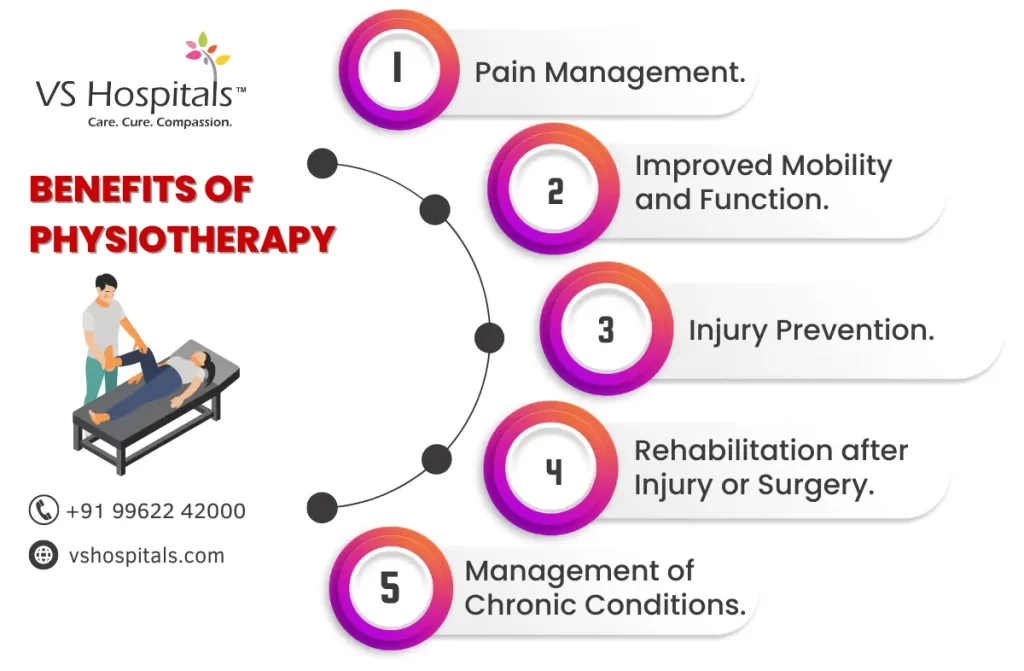Physiotherapy, also known as physical therapy, is a branch of rehabilitative healthcare that focuses on assessing, diagnosing, and treating conditions that affect physical function. With expertise in anatomy, biomechanics, and therapeutic techniques, the best physiotherapist in Chennai utilizes a range of modalities to help patients recover from injuries, manage chronic pain, enhance mobility, and promote wellness.
Who is a Physiotherapist?
A physiotherapist is a qualified healthcare professional who possesses in-depth knowledge of the human body’s structure and function. The best physiotherapist in Chennai specializes in assessing, diagnosing, and treating physical impairments, disabilities, and movement disorders. These professionals work in a variety of settings, including hospitals, clinics, sports facilities, and community health centers.
When to Approach a Physiotherapist?
Physiotherapists can assist individuals of all ages and physical conditions. It is advisable to approach a physiotherapist in Chennai in the following situations:
1. Rehabilitation after surgery or injury.
2. Chronic pain or discomfort in joints, muscles, or nerves.
3. Sports-related injuries or performance enhancement.
4. Pre- and post-natal care for expectant or new mothers.
5. Management of neurological conditions (e.g., stroke, multiple sclerosis).
6. Age-related issues such as osteoporosis or arthritis.
7. Postural problems and ergonomic advice.

Diagnosis and Treatment Procedures
When you consult the best physiotherapist in Chennai, they will begin by conducting a thorough assessment to understand your specific condition and develop an appropriate treatment plan. The assessment may include evaluating your medical history, conducting physical examinations, and utilizing specialized tests if required.
Based on the findings, the best physiotherapist in Chennai will design an individualized treatment program that may involve:
- Manual Therapy: Hands-on techniques such as joint mobilization, soft tissue massage, and manipulation to alleviate pain, restore joint mobility, and improve tissue flexibility.
- Exercise Prescription: Tailored exercises to improve strength, flexibility, endurance, and balance, promoting overall functional improvement.
- Electrotherapy Modalities: The best physiotherapist in Chennai makes use of modalities such as ultrasound scan, electrical stimulation, or heat therapy to manage pain, reduce inflammation, and enhance tissue healing.
- Education and Advice: Guidance on self-management techniques, ergonomic modifications, and lifestyle changes to prevent reoccurrence and promote long-term health.
- Assistive Devices and Mobility Aids: Recommendations for utilizing devices such as crutches, walkers, or braces to facilitate movement and independence.
How to Choose the Best Physiotherapist in Chennai?
You have to consider these factors to choose the best physiotherapist in Chennai.
1. Check Credentials: Ensure the physiotherapist is licensed and registered with the appropriate regulatory body.
2. Experience and Specialization: Look for experience and expertise in treating your specific condition or injury.
3. Recommendations: Seek referrals from trusted sources such as healthcare professionals, friends, or family members who have had positive experiences.
4. Location and Accessibility: Consider the proximity of the clinic and the ease of reaching it for regular appointments.
5. Research Online: Read reviews and testimonials to gauge patient satisfaction and the overall reputation of physiotherapist in Chennai.
6. Communication Skills: Evaluate their ability to listen, understand your needs, and communicate clearly.
Conditions Treated by Physiotherapy
- Musculoskeletal Injuries: Physiotherapists help manage and treat injuries related to muscles, bones, and joints, such as back pain, sprains, and fractures.
- Post-Surgical Rehabilitation: Essential for recovery after surgeries like joint replacements or spinal operations, physiotherapy aids in regaining strength and mobility.
- Sports Injuries: Effective for treating common sports injuries, including strains, tendonitis, and ligament injuries.
- Neurological Conditions: Helps in rehabilitation for stroke, Parkinson’s disease, and multiple sclerosis, improving motor function and coordination.
- Respiratory Conditions: Assists with breathing exercises and techniques for conditions like chronic obstructive pulmonary disease (COPD) and asthma.
- Chronic Pain Management: Provides relief for long-term pain conditions like arthritis or fibromyalgia through targeted exercises and techniques.
Benefits of Seeing a Physiotherapist
- Pain Relief: Physiotherapy techniques can effectively alleviate pain from various conditions, reducing the need for medications.
- Improved Mobility: Helps restore movement and flexibility, making daily activities easier and more comfortable.
- Enhanced Strength: Targeted exercises build muscle strength and endurance, supporting overall physical health.
- Preventative Care: Provides strategies to prevent injuries and manage chronic conditions, reducing the risk of future problems.
- Personalized Treatment: Offers tailored rehabilitation plans based on individual needs and conditions, ensuring effective outcomes.
- Education and Advice: Physiotherapists educate patients on proper posture, body mechanics, and exercise routines to maintain health and prevent issues.
Types of Therapies Provided by Physiotherapists
Physiotherapists are healthcare professionals who specialize in assessing, diagnosing, and treating a wide range of musculoskeletal and neuromuscular conditions. Here are some of the types of therapies provided by the best physiotherapist in Chennai:
- Manual Therapy: This hands-on approach includes techniques like joint mobilization, soft tissue massage, and manipulation to improve joint mobility, reduce muscle tension, and alleviate pain.
- Exercise Therapy: Physiotherapists design customized exercise programs to enhance strength, flexibility, and endurance. These exercises help patients recover from injuries, surgery, or chronic conditions.
- Electrotherapy: Modalities such as ultrasound, electrical stimulation, and TENS (Transcutaneous Electrical Nerve Stimulation) are used to manage pain, reduce inflammation, and promote tissue healing.
- Thermotherapy and Cryotherapy: Heat and cold therapies are utilized to relieve pain, reduce muscle spasms, and manage inflammation. Hot packs and ice packs are commonly employed for these purposes.
- Neurological Rehabilitation: For patients with neurological conditions like stroke or Parkinson’s disease, physiotherapists focus on improving mobility, balance, and coordination.
- Cardiovascular Rehabilitation: These programs are designed for patients with heart conditions and aim to improve cardiovascular fitness and reduce the risk of future cardiac events.
- Respiratory Physiotherapy: Physiotherapists help patients with respiratory conditions like asthma or chronic obstructive pulmonary disease (COPD) through breathing exercises and airway clearance techniques.
- Pediatric Physiotherapy: Specialized care for children to address developmental delays, congenital conditions, or injuries.
- Geriatric Physiotherapy: Tailored programs for elderly individuals to enhance mobility, prevent falls, and manage age-related conditions like osteoarthritis.
- Sports Injury Rehabilitation: Athletes receive specific treatment plans to recover from sports-related injuries and prevent future ones.
- Pelvic Health Physiotherapy: For issues like incontinence, pelvic pain, or prenatal/postnatal care, physiotherapists provide exercises and techniques to strengthen the pelvic floor muscles.
- Lymphedema Management: Physiotherapists help manage swelling and discomfort associated with lymphedema through techniques like manual lymphatic drainage and compression therapy.
What are the risks of physiotherapy?
Physiotherapy is generally considered safe when administered by trained professionals. However, like any medical intervention, there are potential risks and complications associated with physiotherapy, although they are rare. Some of the risks include
1. Increased pain or discomfort: In some cases, physiotherapy exercises or techniques may exacerbate existing pain or discomfort, especially if performed incorrectly or excessively.
2. Muscle soreness or fatigue: Certain exercises or manual techniques may lead to temporary muscle soreness or fatigue, particularly in individuals who are not accustomed to physical activity.
3. Joint stiffness or instability: Improper application of physiotherapy techniques may result in joint stiffness or instability, especially if the exercises are too aggressive or inappropriate for the individual’s condition.
4. Injury: In rare instances, incorrect execution of physiotherapy exercises or techniques could lead to injury, such as muscle strains, ligament sprains, or joint dislocation.
To mitigate these risks, it’s essential to seek treatment from qualified and experienced physiotherapists. In Chennai, individuals can find reputable physiotherapy clinics with skilled professionals, such as the Best Physiotherapist in Chennai. These experts can provide personalized care and ensure safe and effective treatment tailored to each patient’s needs and condition.
Types of Injuries that Can be Healed with Physiotherapy
These are some common types of injuries that can be effectively treated with physiotherapy:
- Muscle and Tendon Injuries: Strains, sprains, and overuse injuries affecting muscles and tendons, such as rotator cuff injuries, Achilles tendonitis, and hamstring strains, often respond well to physiotherapy.
- Joint Injuries: Injuries to joints, including the knees, ankles, shoulders, and hips, can benefit from physiotherapy. Physiotherapists use techniques like joint mobilization, stability exercises, and bracing to promote healing and restore mobility.
- Back and Neck Pain: Whether caused by poor posture, herniated discs, or muscle imbalances, physiotherapy can provide relief from back and neck pain through exercises, manual therapy, and postural education.
- Fractures and Orthopedic Surgery: After fractures or orthopedic surgeries, physiotherapy helps individuals regain strength and mobility. Therapists tailor rehabilitation programs to each patient’s specific needs.
- Sports Injuries: Athletes often turn to physiotherapy for sports-related injuries like sprains, ligament tears (e.g., ACL tears), and stress fractures. Treatment includes sports-specific exercises and conditioning to return athletes to their pre-injury level of performance.
- Neurological Injuries: Conditions like stroke, traumatic brain injuries, and spinal cord injuries benefit from physiotherapy to improve mobility, balance, and coordination.
- Auto Accident Injuries: Whiplash, soft tissue injuries, and musculoskeletal pain resulting from car accidents can be effectively treated with physiotherapy techniques like manual therapy and therapeutic exercises.
- Pediatric Injuries: Children with injuries or developmental issues can receive physiotherapy to promote healthy growth and development, manage conditions like cerebral palsy, and address musculoskeletal problems.
- Geriatric Injuries: The best physiotherapist in Chennai helps elderly individuals recover from injuries like hip fractures, joint replacements, and age-related conditions such as osteoarthritis and osteoporosis.
The Importance of Physiotherapy
Physiotherapy holds significant importance in healthcare for several reasons, playing a crucial role in rehabilitation, injury prevention, and overall well-being. Here are key aspects highlighting the importance of physiotherapy:
Rehabilitation and Recovery
Physiotherapy is instrumental in aiding the recovery of individuals recovering from injuries, surgeries, or medical conditions. Therapists design customized exercise programs to improve strength, flexibility, and mobility, facilitating a faster and more effective recovery.
Pain Management
Physiotherapists use a combination of methods, including manual therapy, exercises, and modalities, to relieve pain. Through targeted interventions, they address the root causes of pain, helping patients manage and reduce discomfort without solely relying on medication.
Enhanced Mobility and Function
Physiotherapy focuses on restoring and optimizing physical function. Therapists work on improving joint mobility, muscle strength, and coordination, enabling individuals to regain or enhance their ability to perform daily activities.
Injury Prevention
Physiotherapists assess biomechanics, identify weaknesses, and provide exercises to prevent injuries. Through education on proper body mechanics and movement patterns, individuals learn how to reduce the risk of injuries during sports, work, or daily activities.
Chronic Disease Management
Physiotherapy is vital in managing chronic conditions such as arthritis, diabetes, or heart disease. Therapeutic exercises and lifestyle modifications prescribed by physiotherapists contribute to improved overall health and better management of chronic health issues.
Posture Correction
Poor posture can contribute to various musculoskeletal issues. Physiotherapists assess and address postural imbalances, providing exercises and guidance to correct alignment and reduce the risk of developing related problems.
Respiratory Support
Physiotherapists play a key role in respiratory care, assisting individuals with breathing difficulties or lung conditions. Techniques such as chest physiotherapy and breathing exercises help improve lung function and respiratory muscle strength.
Neurological Rehabilitation
For individuals with neurological conditions like stroke or spinal cord injuries, physiotherapy is crucial. Therapists focus on improving motor control, balance, and coordination, helping individuals regain independence and functionality.
Mental Health Support
Physical well-being is closely connected to mental health. Physiotherapy can positively impact mental well-being by reducing pain, improving sleep, and enhancing overall quality of life. Exercise, a key component of physiotherapy, is known for its mood-boosting effects.
Patient Education
Physiotherapists educate patients about their conditions, treatment plans, and strategies for self-management. This empowers individuals to actively participate in their recovery and adopt healthier lifestyle choices.
In summary, physiotherapy is a multifaceted discipline that contributes significantly to holistic healthcare, addressing physical, functional, and emotional aspects of well-being. Its preventive and rehabilitative approaches make it an essential component in maintaining and improving the health of individuals across various age groups and health conditions.
Do physiotherapists provide treatments at home?
Yes, many physiotherapists offer home-based treatments, providing personalized care in the comfort of a patient’s residence. This approach is particularly beneficial for individuals with mobility issues or post-surgery recovery. Home physiotherapy sessions allow for targeted interventions, exercises, and assessments tailored to the patient’s specific needs, promoting convenience and accessibility in the rehabilitation process.
Future Trends in Physiotherapy
The future of physiotherapy is promising with several emerging trends:
- Tele-physiotherapy: Remote services via video calls, making care accessible to rural areas.
- Wearable Technology: Devices like fitness trackers help monitor movement and activity, enabling personalized treatment plans.
- Virtual Reality (VR): VR headsets simulate exercises, enhancing engagement and outcomes.
- Robotics and Assistive Devices: Advanced robotics assist with movement and rehabilitation, especially post-injury.
- Artificial Intelligence (AI): AI analyzes patient data for accurate diagnoses and effective treatment plans.
- Holistic Approaches: Combining physiotherapy with yoga, Pilates, and mindfulness for comprehensive care.
- Specialization: More physiotherapists focusing on areas like sports, pediatrics, or geriatrics.
- Regenerative Medicine: Using treatments like stem cell therapy for better recovery.
- Community-Based Programs: Expanding services in local health centers for broader accessibility.
Factors to Consider While Choosing Physiotherapists in Chennai
- Qualifications: Ensure they have relevant degrees (BPT, MPT) and are registered with IAP.
- Experience: Look for experience in treating your specific condition.
- Specialization: Choose someone specializing in your area of need.
- Reputation: Check reviews and seek recommendations.
- Location: Opt for a conveniently located clinic.
- Facilities: Ensure the clinic has modern, well-maintained equipment.
Conclusion
Whether you are recovering from surgery, dealing with chronic pain, or seeking to improve your sports performance, consulting the best physiotherapist in Chennai like Mr. David Vinoth Raj at VS Hospitals can be immensely beneficial. By considering the comprehensive care and expertise provided by physiotherapy, individuals can embark on a path toward better health, greater mobility, and improved quality of life.
Read also Obesity Causes Symptoms and Treatment.




